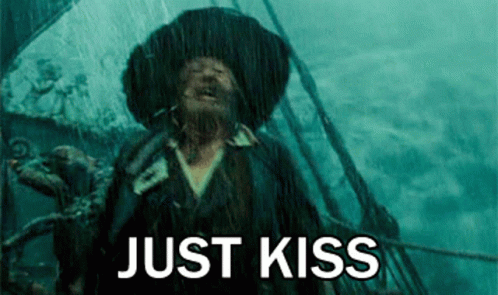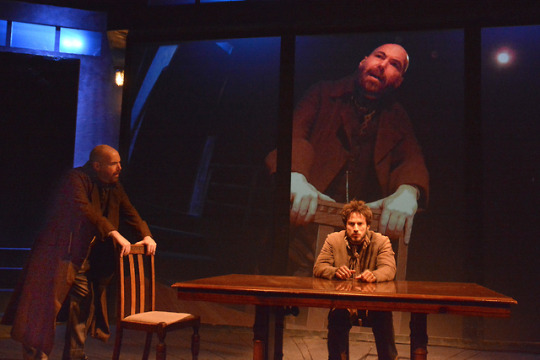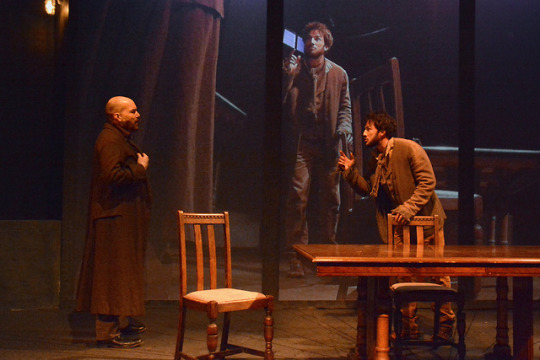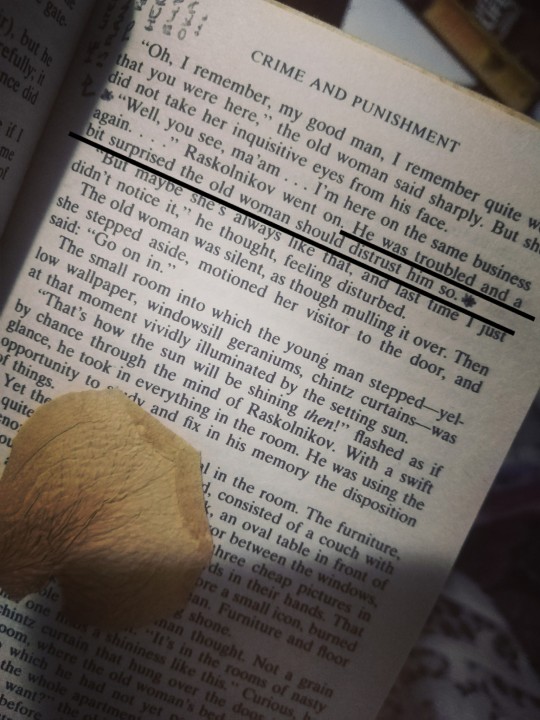#roskolnikov
Text
Not Dostoevsky predicting the modern toxic masculine fanboy of podcast bros and the dangers that their rethorics could potentially pose (paired up with idolism of said toxic male online figures) with Roskolnikovs hard on for Napoleon
#crime and punishment#classic lit#fyodor dostoevsky#classic lit memes#dostovsky#andrew tate#Dostoevsky#roskolnikov#rodion romanovich raskolnikov#napoleon
284 notes
·
View notes
Text

Bitches be saying: "I AM Raskolnikov."
It's me. I'm bitches.
#i am him#he is me#crime and punishment#fyodor dostoevsky#Roskolnikov#russian literature#currently reading#sad books#fictional characters#reader#reading#books#bookish
10 notes
·
View notes
Text
That moment when you’re trying to get 2 characters to kiss, but they won’t stop discussing philosophy and ethics 🤦♀️
Such a pretty mouth—Those little movements were doing something to his libido. Feeling a bit too hot under the collar, Tom forced himself to look away. He pushed himself off the desk, crossed the room to his trunk and retrieved the bottle of scotch from its confines. He summoned two crystal glasses and cast a nonverbal, wandless cooling charm on the bottle before making his way over.
“What are you reading?” Tom wondered, sitting next to Harry in the lounge. He poured a glass of the amber liquid for both him and Harry, peering over his shoulder. “Dostoyevsky?” Tom’s surprise was noticeable to both of them.
Harry took one of the glasses from him, as he turned, arching that same scared brow. “What? Why are you so surprised?” He asked. “Crime and Punishment is considered to be a literary masterpiece.”
“It is,” Tom agreed. “But I just didn’t expect you to pick it up out of all the things on that shelf…”
“I guess you were expecting me to look through the untouched quidditch books over there or maybe the Tales of Beedle and Bard? You know, despite that running joke about me, I do actually read,” Harry didn’t sound offended, but his words could’ve been misinterpreted as such out of context.
“I know,” Tom said. “I just wasn’t expecting you to single this out.”
“Your worst sin is that you have betrayed and destroyed yourself for nothing—“ Harry tapped his finger on the page, “that line hits a lot differently now than when I first read it.”
Taking a drink from his glass, he hummed as he thumbed through the pages. Tom watched curiously, as he stopped on another, “and Roskolnikov lived in a cupboard too—“ Harry snorted. “How bloody ironic, huh?”
“Do you relate to him?” Tom asked.
Harry paused, glancing at him. He shook his head. “No, not really. I think he reminds me of someone I knew.”
“Was that person a murder too?”
Harry nodded. “He was.”
Tom tilted his head in question, waiting for Harry to elaborate. After a stretch of silence he prompted, “Was?”
“He died,” Harry told him. “All of his actions caught up to him in the end.”
There was an interesting note in his voice. Some emotion that Tom couldn’t quite pinpoint. It wasn’t sadness, but just as somber. It wasn’t pity, but something just as sympathetic. Nor was it guilt, but something just as remorseful. “I imagine that he would’ve related to Roskolnikov. Both from poverty, both too brilliant for their own good, both ultimately destroying themselves in pursuit of their own egos…”
Me:

#udlttom spinoff#tomarry#tom riddle#harry potter#time travel au#snippet#udlttom#it is some interesting dialogue tho
29 notes
·
View notes
Text
John is ambitious, driven, and intelligent. He works for a high-profile consulting firm and sits on the advisory board of a political think tank. Hold him in your mind's eye, and ask yourself a question: In the absence of other information, would you want to be friends with him? Now, let's just change for a moment John's name to Joan. Repeat the same exercise. Would you want to be friends with her?
No matter what you answer in this hypothetical example—likely, you know the "right" answer and so respond accordingly—we know that, on the whole, this Joan would fare far worse on the friendship scale than her John counterpart. She would very likely be considered as less warm, and consequently, less appealing friend material. Successful, maybe. But someone you'd want to have a drink with? Not so much.
Over the last 30 or so years, work by social psychologists like Susan Fiske and Mina Cikara has repeatedly demonstrated that women are perceived and evaluated on different criteria than men: not only are the same traits that are seen as positive in one (say, assertiveness in men) reconstrued as negative in the other (say, pushiness in women), but we put different relative values on different traits depending on gender. Niceness, for instance, is seen as consistently more important in women than it is in men—something that high-profile women from Hillary Clinton to Margaret Thatcher have felt all too well, no matter what they try to do and how they try to act.
Now, even fictional females are feeling the sting. In an April 29 interview with Claire Messud, Publisher Weekly's Annasue McCleave Wilson wondered whether Messud would want to be friends with her protagonist, Nora. Nora was, after all, just so very angry, "almost unbearably grim."
"For heaven's sake, what kind of a question is that?" Messud shot back (understandably), proceeding to rattle off any number of unpleasant male protagonists, from Philip Roth's Mickey Sabbath to Dostoyevsky's Roskolnikov, about whom, one presumes, no one would even think to ask such a question. "If it's unseemly and possibly dangerous for a man to be angry," Messud says, "It's totally unacceptable for a woman to be angry."
McCleave's question—and Messud's outburst—raise two broader issues. First, do people treat male and female literary characters differently? That is, are readers actually more inclined to evaluate female, as opposed to male, protagonists on the basis of their potential as friendship material? And second, gender issues aside, what kind of a question is that, anyway—a legitimate one, or, in essence, a fairly dumb one? Should we be going to literature to look for potential friends in the first place?
Gender perception can be a pernicious thing: Where a lack of warmth passes in a male, in a woman, it's deadly. Messud is correct to point out that what is simply dangerous in a man is often seen as unacceptable in a woman. In fact, I would go a step further. Where anger can be seen as a relative positive in a man, it is hardly ever perceived as anything other than a negative in a woman. Consider: Assertiveness is repeatedly ranked as a positive, important central trait in males. In something known as the halo effect, we tend to evaluate secondary characteristics in light of the overarching primary ones that we look for. So, when we think of a male as assertive (good), we will likely reinterpret his anger as just a facet of that assertiveness. If we see a woman as lacking in warmth (bad), anger becomes a sign of her, to borrow McCleave's words, unbearable grimness.
It's not at all a far jump to think that overall perceptions of gender—and what is and is not important in gender roles—would carry over from life to fiction. After all, not only is the opposite frequently the case—a number of psychologists contend that we use fiction to learn empathy in our actual interactions—but our theories regarding other people tend to remain relatively constant, irrespective of context. Messud is certainly correct in calling out the gender-centric nature of her interviewer's perception of Nora; chances are good that, given a male character, interviewer and outside reader alike would be more likely to shrug off or smile at the anger (good old Sabbath, acting up again) instead of letting it color the entire reading.
But there's another issue at play here, gender considerations aside, and that's the nature of the question itself. Should we be looking to fiction for friendship material to begin with? Imagine for a moment that someone wrote an impassioned critique of Crime and Punishment on the basis of Raskolnikov's unworthiness, or denounced Macbeth because Lady Macbeth would likely turn out to be one of those frenemies who invites you for a sleepover and takes the opportunity to poison you and ruin your reputation on the chance your survive, or railed at The Inferno because, out of all of its major players, hardly a one would pass muster as friendship material. You'd dismiss any of those arguments as absurd from the get-go. Judge literature on the merits of its characters-as-my-best-friend material and you lop off the vast majority of the literary canon—and much of modern fiction along with it (goodbye, Jonathan Franzen; farewell, Raymond Carver, J. M. Coetzee, and Orhan Pamuk). Such a reading misses the point entirely.
Conduct that exercise, and you see how inane the question is to begin with. Why in the world would you possibly ask it? The goals of literature are multifold, but creating nice, positive protagonists that you'd want to grab drinks with or invite home to mom can hardly be considered one of them.
But here's the thing. I've never met McCleave, but I would guess that she is far from inane or unperceptive. I'd venture to guess that she simply didn't think twice about her question or its relative merit (or lack thereof) because, well, she was a woman talking to a woman about a woman. As David Daley pointed out in Salon, the question "might not be posed to a male author in quite this way." Nor, I would add, would it be posed the same way by a male interviewer (who would be all too aware of its potential bias) or about a male protagonist (who would be evaluated differently to begin with). McCleave thought herself on safe ground—and ran afoul of the gender biases that tend to permeate our perceptions on a fundamental level, female or no.
I hate writing about gender in literature. Not because I don't think it matters, but because there are others who do it better, on the one hand, and on the other hand, I find that you often have far more productive discussions—and address many of the same issues in a deeper way—when you stop letting gender be a necessary focal point.
Three years ago, Emily St. John Mandel wrote an essay in praise of unlikable characters. There was no gender frame to set her off, no conflict or media flurry to prompt her writing. It is a measured, insightful, engaging piece that deals evenly with men and women, with no other agenda than to talk about the nuance and intrigue that accompany protagonists you wouldn't let within arm's—make that city block's—length of you in real life. In fact, were they to bother you with overtures of friendship, you'd be apt to get a restraining order.
In researching this piece, St. John Mandel's essay is the single best writing on the subject of literary-characters-as-friends that I came across. Her conclusion sums up the argument beautifully:
The point is that these characters aren't real, even the ones wrought by a master like Updike. What is naïve and blinkered is the insistence that fictional characters be held to the same moral and behavioral standards we expect of our friends. It seems to me that part of the point of literature is to enlighten and expand, and there are few pleasures in fiction that expand our consciousness further than getting to observe the world from the perspective of characters so different from us, so thoroughly flawed, that if we were to encounter them in real life we wouldn't like them very much.
I don't think it an accident that gender had nothing to do with St. John Mandel's writing. She was just doing what a good literary critic should do: reading objectively, with an eye to merit and away from anything that has absolutely nothing whatsoever to do with that merit—such as gender.
Would she have been able to accomplish that within a gender frame—or would the frame itself have belied the basic point? Consider Messud's immediate reaction to her interviewer's question. Straight off, she becomes quite defensive. She rattles off a list of other negative males who have been judged in a far different light from her Nora and goes to great lengths to explain that the question should instead deal with the merits of the literature itself ("is this character alive?"), essentially explaining McCleave's job—and her engrained bias—to her in not so many words.
That reaction would have been quite different had the question been posed to, say, Philip Roth. True, Roth would likely never be asked that to begin with. But what if, for the sake of argument, he were? I'd imagine he would have raised an eyebrow, called out its sheer stupidity, and moved on. He wouldn't have expended an extra ounce of energy on responding. He wouldn't have moved on to gender, or thought of gender, or considered deeper gendered implications. He would just call it out for what it is. Stupid, regardless of anything else.
Why doesn't Messud just call McCleave out and leave it at that? It's simple. She can't. "For heaven's sake, what kind of a question is that?" she asks. What kind of a question, indeed. End of story for a Roth. But it's not the end of the story for Messud, or any other female for that matter, because she realizes that it is, fundamentally, inspired by a gendered reading. And so, she goes to great lengths to bat it back.
Is that the right approach? I'm not sure. On the one hand, I do understand where Messud is coming from—and I think it's safe to assume that neither McCleave nor anyone else will be asking anything similar in the near future. But on the other hand, is it really worth giving such blatant wrongness the benefit of intellectual discussion? Something so grossly misguided may not be worthy of serious response. What kind of a question is that? The kind that may not merit further consideration to legitimize its points or its underlying assumptions.
0 notes
Text
yine nereden baksan
Roskolnikovdan Selime doğru süren,süregelen yalnızlık.
Bitmez tükenmez değişmez yalnızlık,uyumsuzluk.
Nereden baksan tutunamayanlık.
Nereden baksan vakit doldurmak.
Nereden baksan umutsuzluk.
#gülaytürk#roskolnikov#tutunamayan#tutunamayanlar#şiir#3ekim2019#şair#düzyazı#içtengelen#safsata#bazen#edebiyat#tbt#kimizaman#edebisözler#yazı#3.10.2019#kimizamansafsatalar
18 notes
·
View notes
Text

Ezekiel Roskolnikov
1 note
·
View note
Text
Grading every Peter Lorre character from a movie I've seen on a scale of 1-10 part 2
•Roderick Roskolnikov-Crime and Punishment(1935)
Naturally, it's nice getting to see Peter play a leading man. It's a shame he didn't get to play such characters more as we really feel for Roderick with his guilt, fear of getting caught, his feelings for Sonya, his protectiveness over her and his family and of course, his lack of faith in humanity. The scene that sticks out to me the most is when he falls to his knees infront of his mother and she tells the story about the kitten he nursed back to health as a child. Partially because it mirrors the scene where he does the same thing to Sonya, but also because I find is striking how the story contrasts with Roderick as we see him in the film. And I'm not even necessarily talking about how he killed someone at that point. He just seems like such a broken man and its both heartbreaking to think of him as once being such an innocent and sensitive child, yet also believable, giving how hard he tries to take care of his loved ones. Not to mention, that scene where he takes care of his sisters creepy, dickhead suitor is nothing short of iconic
6/10 I'm starting to feel guilty for how low I'm rating such complex characters, but the heart wants want it wants
•The Hairless Mexican-The secret agent(1936)
The general is a fun character. Definitely the most enjoyable thing about his movie, although that's nothing you can't say about any Peter Lorre character. Still, THM has some great qualities of his own. His unique fashion, all of the images of him with the dog, him being called a lady killer and replying "not just ladies" and my personal favourite moment, when he makes his lady friend do that shrill squeal and then mimics it. Idk why, but that moment just tickles me. If there's one thing that sours me to this funky guy, it's the fact that images of him and Joel Cairo sometimes get mistakingly used interchangeably. Not saying thats a flaw with the character or his film obviously, just grinds my gears and this seems like as good a place as any to whine about it. 5/10
•Colonel Gimpy/Baron Rudolph Maximilian Taggar-Crack-up(1936)
The thing I love most about Gimpy is that he allows Peter to play both a funny, adorable, seemingly innocent nitwit and a suave, cunning criminal mastermind in one film. Sure, there are other characters Peter plays who have elements of both types of characters-such as Cairo, whos attempts to seem like a capable, respectable businessman are undermined by how others treat him aswell as his frequent temper tantrums or Polo who's a good natured, sensitive dope who's capable enough at tricking people to keep performing the same scam with Tanya and Andre, but even when playing a part is still a sensitive, chipper klutz. However, unlike those two, who's true personalities show through their acts, nothing of Baron Tagger is visible to people who only know Gimpy, the harmless eccentric with the trumpet. His act is so convincing he can admit to shooting a man seconds before that man's death is announced on the radio and because Gimpy is obviously a harmless eccentric, the whole thing will be brushed of as an eerie coincidence
7/10. I'm gonna be saying this a lot, but Peter was too good for this flick
#peter lorre#the secret agent#the hairless mexican#crack-up#yknow i had it in my head that the first one of these would be an exception and most of tgese would be short#but fuck it this is fun#grade#roderick raskolnikov#crime and punishment#how the hell am i only now noticing i never even tagged the first character and film intil now???#i guess while this was still incomplete in my drafts i started putting the tags in#realised i had no clue how to spell rodericks name#thought 'oh ill add that in right before i post it no worries'#and then just forgot to#i did have the first 3 or so entries completed in my drafts before i posted part 1 juat to make sure i didnt have them all too far apart#which i think i eluded to a bit whenever i explained what happened to part 3#Barron Rudolph Maximillian Tagger
11 notes
·
View notes
Text
Her katil olay yerine döner diyorlardı. Roskolnikov bile dönmedi sen mi döneceksin¿
2 notes
·
View notes
Text
Roskolnikov: I murdered two old women with an axe and now I'm going to insult all your life choices and make a case for why you should kill yourself
Sofya:

I'll follow you to the ends of the earth and fix you you sexy bad boy you xoxo
23 notes
·
View notes
Photo








"Crime and Punishment" starring Michael Trevino as Roskolnikov opens on April 27, 2019 at the Edgemar Center for the Arts in Santa Monica California. For tickes and more information visit onstage411.com/crime.
45 notes
·
View notes
Text

Baby boy baby, meow meow, beloved fucking clown, my (handsome) dumb bag of rocks, you're literally there planning to kill her
#crime and punishment#fyodor dostoevsky#Dostoevsky#roskolnikov#classical literature#russian lit memes#russian literature#classic lit#dostoyevski#Rodian
13 notes
·
View notes
Text
Dining Alone At Plaza Azteca
You are always sending me quotes from books that I haven’t read and probably will never read.
We talk about these quotes like conversation because we don’t have anything else to say to each other.
Instead of talking about current events, pop culture, or emailing YouTube video links back and forth, we talk about the past. The unchanging events of fictional characters with lives that are more interesting than ours. Filtering our current stimuli through the lens of some dead white guy.
You like to point out quotes that seem to abstractly apply to our current situation.
I’m currently shitting. If you were still around you would probably have a quote for that.
Through you I’ve read Phillip Roth:
[“This made me laugh,” you said.]
“Just as I am about to unlock the door, imagining I have covered my tracks. My heart lurches at the sight of what is hanging like snot to the toe of my shoe. I am the Roskolnikov of jerking off- the sticky evidence is everywhere!”
[“It has a section titled ‘Cunt Crazy’. The son has a literal Oedipal fixation on his mother. It is written in stream-of-consciousness self-loathing Jewish-American continuous prose. What is with male writers and their cocks? I’ve never felt the urge to write about jacking off. But it is a perennial fixation for Updike and apparently Phillip Roth.”
I said something like, “I think writing is not dissimilar to masturbation.”]
Under the Loving Care of the Fatherly Leader: North Korea and the Kim Dynasty by Bradley K. Martin:
“North Korea called Carter a ‘vicious political mountebank;” his journey, ‘a powder-reeking trip of a hypocrite agitating for aggression and war.’ But a North Korean spokesman in Tokyo said that, in the North Korean lexicon, this was a relatively moderate slur. At least the North had not called Carter an imperialist, its worst insult. “Not an imperialist! Anything but that!”
[For three days we joked in mock horror about the thought of being called an imperialist. You brought up the joke recently and I groaned in return.]
The Marriage Plot by Jeffery Eugenides:
“He held up the baggie. Leonard stuck his nose into the bag and his depression lifted another notch. It smelled like the Amazonian rain forest, like putting your head between the legs of a native girl that had never heard of Christianity.”
[You called it a ‘paltry piece of fiction’ but you said you wanted to put your head between my legs and I said ‘okay’ even though I had no intention of letting you do that. I remembered the first time you went down on me in the hotel room that you lived in at the time. It was the first time anyone had ever gone down on me. It was the first time someone had done something specifically for me for more than an hour. You kept looking up at me periodically with this apologetic look on your face. I kept looking at your bed sheets, trying to figure out the thread count with a concerned enough look on my face that could have hopefully been misconstrued as a look of pleasure. You had an asthma attack during and after.]
Once, you texted me and said, “I must fuck you.”
I didn’t reply but I took a screen shot of the text. I texted you the screenshot a few days later without context.
It is the only quote I have sent you. I think I sent it in a way that meant, ‘look at all the ridiculous things you say to me.’ But you took it as meaning I wanted to sext.
That was the conversation that you told me I would be good at writing erotica and then made sure to add that you’re too much of a book snob to read erotica. Though, while I was sending you detailed descriptions of how I masturbated (face down, sometimes with lesbian porn) you didn’t seem to mind erotic realism.
Tonight you will text me with something like,
“Intense solitude becomes unbearable only when there’s nothing one wishes to say to another.”
You’ll text me again before I answer and tell me that the quote is from ‘Americana’ by Don DeLillo.
I will look at my Iphone light up then check my Gmail.
While I’m going through my spam inbox, trying to figure out how to get off all of these subscription lists (Macy’s, PETA, Sierra Club, ModCloth, Urban Outfitters) that I thought were a good idea to sign up for at some point, you’ll text me a third time and say something like,
“I just finished a margarita. I am dining at alone at Plaza Azteca”
You have perfectly crafted a scenario within the span of three text messages of a lonely drunk writer, drinking comically tropical drinks in a Mexican restaurant, while contemplating the prose of the ‘American heartland’. In the back of your mind, behind your wire framed glasses, matted, self-conscious beard, and nervously thin lips, you think that this is a romantic vision of a struggling writer that drinks margaritas until drunk or out of cash and eats vegetarian tacos because they are cheaper.
Bukowski in paradise.
You quoted Bukowski too many times to count. It was mostly in reference to how you were so much like him. Or how you thought that drinking at 3 am on a Tuesday while writing self-loathing poetry made you so much like him. I usually waited until about the fifth text in a row to text you back when you got started on your Bukowski rants. I knew that the important part wasn’t that I had anything to say back. The important part was to make you feel like someone else thought you were like Bukowski. I didn’t think that but I also didn’t feel strongly enough against it to start any sort of debate.
I always wanted to tell you that I hate Bukowski.
I hate Bukowski. Maybe you are kind of like him.
In response to the first text in the trilogy I text back,
“I like that quote”
Even though I don’t really like that quote.
I like to sit alone and not talk about how I’m sitting alone. I like to drink to get drunk then go to sleep in my own bed. I don’t mind not having anything to say.
Immediately you respond,
“I knew you would.”
“I want you. Come to me.”
I do not want to drink margaritas with you. I do not want to talk in quotes. I do want to be the kind of person that brings novels to Mexican restaurants.
I do not want to be with the kind of person that thinks bringing a novel to a Mexican restaurant makes them an interesting person.
Some nights I just want to watch Mean Girls and talk about the weather. Some nights I really don’t care what is and isn’t post-modern. Some nights I wish that we were post-conversation.
I wish that we didn’t have to turn everything into a metaphor for itself.
You once told me I was your ‘manic pixie dream girl’ like you had never even spoken to me before. Like I was a caricature of myself or a trope to be employed in one of your short stories. You can never talk to me like I am in the present tense.
If I met you at Plaza Azteca I would order a beer, or I would get you to order a beer for me, and you would start talking about how beer makes your stomach queasy the way I make your stomach queasy. The way you are writing a novella about a girl that makes your stomach queasy. You will use that word ‘queasy’ and I will hate it but I will nod like I am interested in becoming a character. I would spend the evening trying to figure out ways to hide my water cup from the waiter who was determined not to see it empty. I would want to see the cup completely empty. No water, no ice. I would sip my beer and hide my water and you would talk to me about something you read or wanted to read. Something about Gore Vidal or Salman Rushdie. You wouldn’t notice what I was doing with my water. I would think silently about how many water related quotes you had; quotes about being empty.
“K.”
0 notes
Text
“Crime and Punishment” Review
I really liked it, but i found it very surprising, that i was rooting for a murderer. I found it amazing how Dostojevski could make me feel how insane Roskolnikov was, just by repeating the sentences again and again, like his thoughts were going in circles. 3 out of for stars
#littlegingerbookninja#crime and punishment#fjodor dostojevski#review#booklover#tumblr books#96#three out of five stars
0 notes